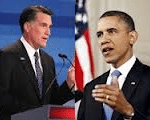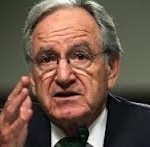![The 2012 Presidential Debates: When Moderators Aren’t Moderate]()
by | Aug 23, 2012
 Lost in the sea of coverage following Mitt Romney’s selection of Paul Ryan as his running mate, was the news that the moderators for the three Presidential debates, and one VP debate, were also selected.
Lost in the sea of coverage following Mitt Romney’s selection of Paul Ryan as his running mate, was the news that the moderators for the three Presidential debates, and one VP debate, were also selected.
There is a certain kind of news one receives that falls into the category of “this may or may not be bad—but it can’t be goodâ€. For Republicans, learning of the moderators that will be at the helm for these four debates certainly earns this distinction.
In order of appearance they are- Jim Lehrer (PBS News Hour), Martha Raddatz (VP Debate-ABC News), Candy Crowley (CNN), and Bob Schieffer (CBS News).
Since the Romney campaign had to sign off on each moderator, it is hard to imagine that they could not have demanded better (even given that the Obama camp also had to sign off on each). By any measure, Jim Lehrer, Candy Crowley, and Bob Schieffer all lean to the left, and the networks that employ them all trail badly in the ratings to their direct competition.
Even if you were to say that these three were the fairest that both sides could agree to, giving a green light to Martha Raddatz for the VP debate was certainly inexplicable. The reason for this being, she is a “foreign affairs correspondent†which is not Ryan’s forte, and in fact he was brought into the race for his economic mastery. One has to wonder how much focus will be put on non-domestic topics just based on her area of expertise. On the surface this seems a major concession to the Obama campaign, and one that needed not be given.
The reason these moderators are so important is three-fold. First, with all the polls showing that the election has a likelihood of being razor-close, every small detail that goes into them has a chance to be huge. Second, like was the case with the Republican Primary debates, these four showdowns will smash records for viewership and the audience will include millions of Independents sizing up the candidates for the first time. Lastly, and most importantly, the questions asked of the candidates have the ability to dominate the crucial weeks of news cycles leading up to Election Day.
So What Should The Focus Be?
Poll after poll shows that for the American people ground zero in this election is the economy. A Pew Research Poll taken from June 7-17 asked voters to name the top issue that they will be considering in the voting booth in November. The top four answers were Jobs (35%), the Budget Deficit (23%), Health Care (19%), and Social Security (11%).
The danger in having biased moderators was on full display for the Republican Primary debate moderated by George Stephanopoulos, when, seemingly out of nowhere, he felt the need to drill down with Mitt Romney and Rick Santorum on the issue of female contraception. This gave birth (no pun intended) to the Sandra Fluke phase of the campaign and a multi-week sidetrack by the media away from the serious issues of the day. There is simply no doubt that, should they choose to, a moderator can actively push the focus to issues that are not widely being considered by voters—and into territory that favors one candidate or another.
As will be the case in October, it just so happens that the issues voters themselves say are paramount are the exact issues that President Obama is desperate to avoid talking about. In theory this would make the debates a huge opportunity for Romney and Ryan to drive home their message—something tells me it won’t quite go down that way.
Perhaps I will be proven wrong, but will these moderators have the gumption to ask President Obama why a myriad of the promises he made while running in 2008 have been unachieved or even un-attempted? Will they remind the American people that twice the President had budgets voted on by Congress, and he failed to receive one solitary vote for either of them? Will they ask why he promised to cut the deficit in half but instead oversaw three years of trillion dollar plus deficits? Or will they inquire why he has not laid a plan on the table for reforming entitlements, after saying himself this was crucial in 2008?
Republican Are Right to Be Nervously Skeptical
All things being equal, and according directly to the polls, the topics discussed during all four of the debates should almost exclusively be jobs, the deficit, the long term health of entitlement programs, and foreign policy. What I fear instead is painful subjection to multiple questions on gay marriage, abortion, contraception, and student loan debt— knowing all the while the fruit is rusting on the vine.
It is true that the level of professionalism that the four moderators will show is yet to be determined, and perhaps at least three of them will be fair (I hold no hope for Bob Schieffer). But given the track record of behavior the major media outlets have shown to Republicans in recent years, I’d say a mildly-crippling nervousness is more than justified.
After all, barring a phenomenal performance by both Republican candidates, one thing is certain—“it may or may not be bad…but it won’t be goodâ€.
The post The 2012 Presidential Debates: When Moderators Aren’t Moderate appeared first on The Conservative Reader.




by | Aug 16, 2012
 The following is an interesting study released recently, and the reaction by the GOP (written up by Jill J.).
The following is an interesting study released recently, and the reaction by the GOP (written up by Jill J.).
In a policy study released by the Public Interest Institute at Iowa Wesleyan College, author Amy Frantz analyzed Iowa’s teen unemployment situation. The report notes Iowa’s unemployment rate for teens has remained consistently high over recent history. Two subgroups are analyzed within the data: teens ages 16-19 and high school graduates 18-20 years old.
The report notes that the unemployment rate for the 16-19 year old group was at a very high 12.3 % in 2002 and over the course of the last decade has remained at the high level, with the most recent report for 2011 showing that the unemployment rate for 16-19 year olds was 13.8%. This is much higher than the overall unemployment rate in Iowa which was just below 6% in 2011. Similarly, the 18-20 year old high school graduate group’s unemployment rate was 9.6% in 2002 and has risen higher, peaking in 2010 with a rate of 19.3% before coming down below 18% in 2011.
Not only are the unemployment rates higher, but an analysis of the number of hours worked for these two groups has seen a reduction in the last decade as well. The average number of hours worked per week for the 16-19 year olds in 2002 was 12.5 hours, but has dropped to 8.1 hours per week in 2011. Again, the 18-20 year old high school graduates faced a similar situation wherein their average hours worked in 2002 was 21.1 per week, falling to 16.7 hours per week in 2011.
The study references the rise in minimum wage as one of the driving forces behind the tremendously high teen unemployment rate. Iowa’s minimum wage was raised by the Iowa Legislature and Governor Culver in 2007 from $5.15 per hour to $6.20 per hour, and then in 2008 it was raised to $7.25. The federal minimum wage was also raised by the Democratically-controlled Congress, up to its current level of $7.25 an hour, matching Iowa’s rate. The study links this rise of the minimum wage to the increase in teen unemployment rate, noting that “teenagers are five times more likely to earn the minimum wage than adults. Thus the impact of an increase in the minimum wage would be felt dramatically by that segment of the workforce.†Those most hurt by a rise in minimum wage are often the youngest and most unskilled workers as businesses cannot afford to pay increased wages for individuals that might not have the necessary training or productivity to bring to the business.
Lastly, the study proposes an idea on how to lower the teen unemployment rate in Iowa. The study proposes to create a “sub-minimum†wage for teen workers in the state, which would allow businesses to pay certain teens an amount below the minimum wage that would apply to all other workers. The study concludes with the observation that “The benefit of having a higher minimum wage is cancelled out if teen workers are receiving fewer hours of work. And for those teens that want a job but cannot find one, their wages are $0.â€

by Art Smith | Aug 10, 2012
 It may be a matter of opinion, but I was a bit disappointed with Wednesday’s Iowa Energy Forum‘s “A Conversation On Energy Luncheon” event at Hy-Vee Hall in Des Moines. A similar event was held by the group, which is sponsored by the American Petroleum Institute, last year (May 25, 2011). One might think that an event hosting two sitting US Congressmen (Leonard Boswell-D and Tom Latham-R) who happen to be running against each other in this year’s election would be an opportunity to have some real discussion about the issues impacting Iowa and American energy concerns, but compared to last year’s event this was a bit of a yawner.
It may be a matter of opinion, but I was a bit disappointed with Wednesday’s Iowa Energy Forum‘s “A Conversation On Energy Luncheon” event at Hy-Vee Hall in Des Moines. A similar event was held by the group, which is sponsored by the American Petroleum Institute, last year (May 25, 2011). One might think that an event hosting two sitting US Congressmen (Leonard Boswell-D and Tom Latham-R) who happen to be running against each other in this year’s election would be an opportunity to have some real discussion about the issues impacting Iowa and American energy concerns, but compared to last year’s event this was a bit of a yawner.
Last year we got a panel of experts from the Iowa energy industries discussing what’s actually being done to expand the development of various energy technologies, including a strong speech by Governor Terry Branstad, and gobs of data regarding energy production and consumption in Iowa.
This year we got mostly platitudes and commitments to vote for good energy policy.
Both congressmen had an opportunity to speak without hearing the other speak first and then answered a few written audience questions.
Leonard Boswell
Congressman Boswell was rather distracted at first with pointing out his military record, which was totally irrelevant to the topic, and although he proclaimed support for the Keystone Pipeline he hedged regarding the routing of the pipeline as the only obstacle for approval of Keystone. His message is essentially that we need “all of the above” solutions for energy independence, and that we need to upgrade the energy infrastructure including improvements to the electrical grid and expansion of natural gas fuling stations along the major interstates.
Boswell also made a point of discussing the impact of climate change on general infrastructure… he provided an anecdotal story about someone in Alaska that was showing him a location where the ground was dry and supposedly had 10 feet of ice many years ago. His punchline for this was that permanently frozen ground did not require digging foundations for supports, but now that areas of the country are losing their permanent frozen ground, those things built on them have to be rebuilt. Although I think the topic is worthy of discussion (and I give Boswell credit for not discussing the idea of human causality), I never got the connection to energy independence. Maybe I’m slow.
Tom Latham
 Tom Latham expressed the same support for Keystone sans concerns about the route. He made an excellent case for the fact that in the early ’70s, our leaders in Washington said we would never have another oil crisis because we would ensure that we had a fully independent domestic oil resource… but as soon as OPEC opened up the spigot we apparently forgot all that. 40 wasted years.
Tom Latham expressed the same support for Keystone sans concerns about the route. He made an excellent case for the fact that in the early ’70s, our leaders in Washington said we would never have another oil crisis because we would ensure that we had a fully independent domestic oil resource… but as soon as OPEC opened up the spigot we apparently forgot all that. 40 wasted years.
Not only did Latham attack Cap and Trade as ill conceived, he pointed out that the EPA was preparing to release a number of regulations the day after the election, each expected to cost Americans over $100 Billion, modeled after the failed legislation.
Latham also explained that with over $70 Trillion in long-term unfunded liabilities, expanding domestic energy production would bring the government tens of Trillions of dollars to fund those liabilities.
All in all, I appreciate both congressmen taking the time to share their thoughts about energy. I would rather (or additionally) had some Iowa specific information provided at the event like last year. Although the conversations with the congressmen were somewhat interesting and perhaps relevant to the upcoming election, the fact that the format was specifically non-partisan, non-debate, non-confrontational kept the whole impact very low. I’m not really saying it should have been an election showdown… I’m just saying I could have gone to the two candidates web sites to get the total information I got at the forum and used a much smaller part of my day to do it. I think this organization would do well to focus on promoting Iowa Energy production and the impact it is having on Iowa and the US.
The food was really good though. (grin)
The Playground
Probably the most interesting conversation happened outside the event while Boswell held his media availability. Short version is this: my friend Kevin Hall of The Iowa Republican had the “nerve” to ask the congressman whether he still supports Cap and Trade. This set off a firestorm of reaction from Boswell’s staff who could not believe the audacity of a mere “blogger” to represent themselves as “media” and ask the important man from Washington a question that doesn’t need to be asked.
Yes, that really happened.
I don’t want to spend the 10 ‘graphs that I have pent up inside explaining why this topic frustrates me (you’ll get them soon enough). It’s not worth the time right now, and keeping this to the “short” version, I just want you to know this was the most childish response I’ve ever heard to a hard question. It is to Congressman Boswell’s credit that he did not join in the behavior of his staffers and answered the question. You can read the whole story from Kevin here.
Oh, and the congressman said “Yes”. Of course he still supports Cap and Trade.
Other commentary and analysis of the forum: Caffeinated Thoughts, The Des Moines Register, and more Des Moines Register.
Photo 1 © vencav – Fotolia.com
Photo 2 © The Conservative Reader.

by Steven Waechter | Aug 7, 2012
 Our esteemed Senator Harkin has been holding some hearings on for-profit colleges back in D.C., and now he has penned an editorial for the Des Moines Register. In full disclosure, I dislike Tom Harkin. Intensely. Then again, back in 2008, Charles Grassley voted for the TARP bailout, and now I don’t like him either.
Our esteemed Senator Harkin has been holding some hearings on for-profit colleges back in D.C., and now he has penned an editorial for the Des Moines Register. In full disclosure, I dislike Tom Harkin. Intensely. Then again, back in 2008, Charles Grassley voted for the TARP bailout, and now I don’t like him either.
But, back to the junior Senator from Iowa; Senator Harkin penned an opinion-editorial decrying the high tuition, poor student outcome, and massive debt of the students of for-profit colleges. If somebody would be so kind as to pass this on to the right honorable gentleman, would Senator Harkin please explain why his criticisms of the for-profit colleges are not extended to all colleges? Why does the servant of the people limit his criticism to the obvious failures of the for-profit schools, and not touch upon the failures, just as obvious, of the Ivy League, non-profit schools, endowment liberal arts colleges, and even state schools?
I have three reasons which instantly spring to mind. First of all, Mrs. Harkin sits on Iowa’s Board of Regents. I don’t think Senator Harkin mentioned that; being a bachelor myself I’m only assuming that it would be appropriate to disclose that information.
Second, college professors and administrators appear to have privileged status in modern American society, and being part of the Nomenklatura (Russian for “Book of Names,†these were people who had earned favors from the members of the Communist Politburo), colleges can’t possibly be permitted to suffer the effects of a recession. After all, if your waitress doesn’t have a degree in sociology, how can we possibly have justice and compassion in our society?
Thirdly, and I think probably the most important, higher education is critical for the current political climate. We are in a deep economic depression and college is a useful way to keep young people busy. It gets them out of their parents’ houses, gives older voters the illusion that the young will be able to support themselves and fund the welfare state, and gives elected officials a ready-made line for why they need to be returned to office and why the public needs to turn over their wealth to the state -because children are the future, and we need to invest in our young people.
Political careerists have used that stupid old trope for decades now. We must, they tell us, rack up enormous debts – as a nation and as individuals – for the sake of the children, who will then grow up as serfs and endure an intense curtailment of their liberty and prosperity to settle the debts that we racked up for the sake of the children. It’s a bit like selling your car for gas money.
So, hurry up and enroll your kids in a state school, and make sure to cosign the Federal Stafford Loan promissory notes. Of course, you need to make sure you reelect your local deputies of the Supreme Soviet to make sure your kids can still get the chance to sign those promissory notes. Our economy, after all, is built on an Education-Employment model, where young people go to college so they can become more attractive to employers – employers who no longer have access to the capital they need to expand their businesses; considering that is where new jobs come from, that might be a bit of a problem – so unless your kids borrow money from the government to get an advanced degree, they might not get that job that doesn’t exist.
More than fifty percent of recent college graduates cannot find full time employment. All of them could get funding for a master’s degree if they really wanted it, though. It doesn’t mean anybody will have the capital to invest in employing them two or three years from now, but it will keep them busy and not officially part of the “unemployed.â€
So, there you have it; as long as federal money is being funneled to state schools to cover exorbitant tuition for degrees not worth the paper on which they are printed, our dear Senator doesn’t seem to mind. I actually agree with Senator Harkin when he condemns the for-profit colleges; but he attacks them for being for-profit, not for being useless. I attack them for being useless – the same sin committed by most every college and university in the country, regardless of who runs them.
No career politician has the courage to take on the real problems facing the American economy, so perhaps Senator Harkin doesn’t warrant extra criticism for his cherry picking and selective righteousness – he certainly doesn’t deserve any credit, either.

by | Jul 24, 2012
 While much of the attention and focus when we head out to vote in November will be on the various partisan political races on the ballot, residents of Polk County will have another very important decision to make–who will be guiding the law enforcement efforts that protect us.
While much of the attention and focus when we head out to vote in November will be on the various partisan political races on the ballot, residents of Polk County will have another very important decision to make–who will be guiding the law enforcement efforts that protect us.
Though it may surprise many, the reason this is important is that some very basic laws on the books are being relegated to the back burner by current Sheriff Bill McCarthy–who has instead decided that the crack down we need is on those breaking the speed limit. While many living in the suburbs are unaware, not all places in Polk County are as safe as the neighborhoods most of us live in. The emphasis and aggressiveness in enforcing current law is vital to improving our safety, protecting our rights, and stamping out problems before they become out of control and directly threatening.
Opposing Sheriff McCarthy this November is Dan Charleston. I would encourage all of you to take a minute and visit his website – Charlestonforsheriff.com – where he goes into detail on the many hot-button issues that are on the table and how he would approach his law enforcement duties in general.
He was kind enough recently to answer some questions for The Conservative Reader: Iowa–mainly focusing on the impact a new Polk County Sheriff could have if he is elected in November. Here is what he had to say:
Should you defeat Bill McCarthy in November, what are the top three things that the citizens of Polk County would notice a change in?
Honoring the Oath of Office and ensuring the protection of individual rights as laid out in the US Constitution and Bill of Rights, will be the first priority when elected Sheriff. We will lead together with innovative ideas and solutions to better serve our community. This will restore faith, hope, and the belief that there is a better future for our families and our right to life, liberty and the pursuit of happiness.
The Polk County Sheriff’s annual budget is over sixty million dollars. The 2011-2012 budgets will bring a mandatory cut of more than 2.5million dollars. There are many ways to accomplish this: retirements, reallocation of top management positions to line staff, inmate food service, fewer take-home cars for positions which do not require one, alternative work schedules, and management to staff ratios brought within the national average. This does not require the loss of staff jobs or a consulting firm’s opinion at taxpayers’ expense.
Recently the Sheriff and board of supervisors voted to allow speed cameras placed in vehicles throughout Polk County. I believe this is unconstitutional based on the sixth amendment. I would not allow the use of speed/red light cameras in Polk County and would lead the effort in getting them removed throughout the entire county.
What would your top priorities be on day one, and how would you best describe your managerial and law enforcement philosophy?
I believe the top priority at the Polk County Sheriff’s Office is to restore the morale of the staff. There is a lack of faith in the leadership which affects the work ethic and overall attitude of the employees.
I believe in maintaining service before self; doing more with less; providing fiscal transparency, common sense solutions, honesty, accountability, trustworthiness, respect, loyalty, and fairness. I also believe in community and an attitude of service shown to the people whom we serve as law enforcement professionals in Polk County.
I believe a law enforcement organization cannot expect to grow and prosper if the skills of its people do not consistently do so. I believe in leading by example through realistic training, innovative ideas, on-going law enforcement education and common sense solutions when issues arise.
I believe that when we promote great leaders, it affects the work ethic, self- worth and pride of our organization, which will then be apparent to the people we serve. I believe Integrity is the most important thing a man or organization can possess, and with it, pride and a humble spirit is shown.
How has the campaign been going? Was there one event or occurrence that drove you to run for this office? Name one impact that a high quality County Sheriff can have on a community that might surprise some people?
The campaign has been going outstanding. The volunteers, radio, TV, webcasts, house parties, public speaking and parades have been very rewarding and informative.
Having been in the military and worked for Los Angeles Sheriff’s Department, I have been a part of first class organizations. Having this experience gives me better vision to see where Polk County needs improvement in its law enforcement practices. Through proactive law enforcement, we can reduce gang activity, drug trafficking, illegal immigration, and unconstitutional speed cameras and lead the way for constitutional carry in this great state of Iowa.
Page 22 of 32« First«...10...2021222324...30...»Last »
 Lost in the sea of coverage following Mitt Romney’s selection of Paul Ryan as his running mate, was the news that the moderators for the three Presidential debates, and one VP debate, were also selected.
Lost in the sea of coverage following Mitt Romney’s selection of Paul Ryan as his running mate, was the news that the moderators for the three Presidential debates, and one VP debate, were also selected.







 While much of the attention and focus when we head out to vote in November will be on the various partisan political races on the ballot, residents of Polk County will have another very important decision to make–who will be guiding the law enforcement efforts that protect us.
While much of the attention and focus when we head out to vote in November will be on the various partisan political races on the ballot, residents of Polk County will have another very important decision to make–who will be guiding the law enforcement efforts that protect us.